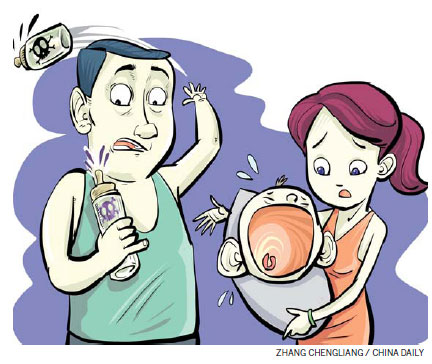Parents at a loss after new milk safety scandal

Fonterra issue indicates that big is not necessarily safe in the dairy industry
Several months ago, I wrote a column on Chinese parents' concern over food safety after a potentially toxic chemical was found in milk produced by New Zealand's Fonterra, which later caught the media's attention in that country.
The New Zealand Herald, in an analytical report on the incident, called my writing "impassioned" for summing up "a lot of the sentiment being expressed by consumers on China's social media". For example, I wrote: "Like many sensitive parents, I'd not be easily placated by assurances that 'very low levels' of dicyandiamide, or DCD, in food don't pose a risk after going through the shockwaves of the 2008 tainted milk scandal that killed six infants and left more than 300,000 children with various ailments on the mainland."
Well, I wish I had overreacted then, because just when we thought consumers had moved on after public attention had been diverted by other food-related problems, the dairy giant struck fear in people's hearts again by saying it had found deadly bacteria in some of its products. The bacteria can cause botulism, a severe, sometimes fatal, food poisoning. Since earlier this month, the new milk scare has triggered a ban on imports and the recall of a number of popular foreign brands that use the world's largest dairy exporter's ingredients.
This time, probably few Chinese consumers will believe it is just a blip and Fonterra, which owned a large stake in the now defunct Sanlu Group that was embroiled in the 2008 scandal, will rebound any time soon in the Chinese market. The Chinese media have compared the company's frantic crisis communication to patching a burnt hole in a suit: No matter how hard you try, it will never be the same.
Unfortunately, the plight of mighty foreign brands like Fonterra will make the search for safe milk powder even harder for urban Chinese parents who still have little faith in domestic products because of a series of tainted milk scandals.
Amid the panic, nervous parents have come up with some creative ideas and tips. Some have decided to use different brands alternately and as often as possible to reduce risks. Some have called for longer periods of breastfeeding and others for exploring alternative sources of milk, like camel milk, which cost much more but until now is "untainted".
On a more practical note, though, parents will continue to buy foreign infant formula that have not been recently involved in a food safety scandal. Because such products are becoming rare in China, people of means have widened their search, stocking supplies of lesser-known but reputable foreign brands.
Many more may have already started giving a second thought to domestic products that they have always tried to avoid. With several foreign brands implicated in safety and pricing scandals, the choice between buying foreign and domestic products seems increasingly like opting for the lesser of two evils.
At the urging of the government, major domestic companies, of late, have been trying to win back consumers' trust and regain some of their lost shares in the domestic dairy industry through mergers and restructuring. They are keen to use foreign raw materials or produce them in overseas plants as a way of repairing their tattered reputation.
However, as the Fonterra case shows, big is not necessarily safe and top foreign brands are not free of scandals. It may take years for Chinese dairy companies to take off again, for which they have to fix some chronic problems such as lack of transparency and a sense of responsibility for consumers.
Until then, parents will live in constant fear of tainted food while domestic and foreign players both walk a tightrope amid increasing public scrutiny.
The author is editor-at-large of China Daily.


















